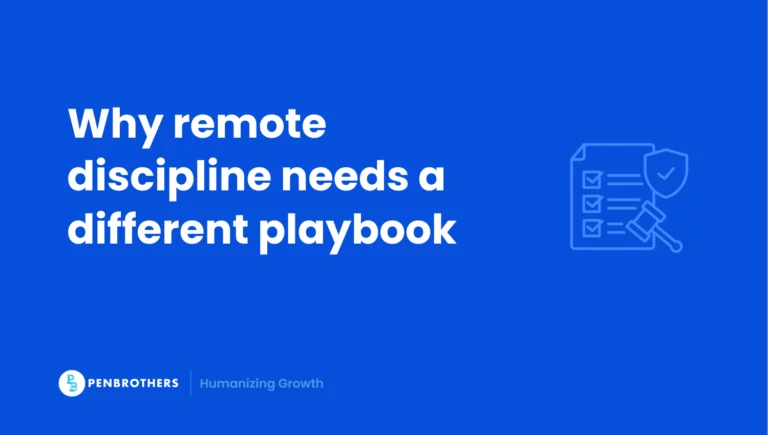In the boardroom, timing is everything. So is talent. Hiring the right executive can change a company’s trajectory overnight. But finding them? That’s another story.
For CEOs, founders, and HR leaders navigating periods of growth or transformation, the stakes are too high for guesswork. This is where executive search firms step in. Not just as recruiters, but as strategic partners who understand leadership, industry nuances, and the long-term implications of every senior hire.
At Penbrothers, we’ve seen firsthand how the right leadership transforms teams—and how the wrong hire costs more than just money. If you’re still deciding whether an executive search firm is worth the investment, this guide will help clarify the value they bring, how they operate, and whether now is the time to bring one into your hiring ecosystem.
What Is an Executive Search Firm?
An executive search firm, also called a headhunting agency, specializes in sourcing senior-level talent. Think C-suite officers, department VPs, board members, and other niche, strategic roles.
Unlike general recruitment agencies that cast wide nets, executive search firms work with precision. They operate discreetly, target passive candidates, and curate candidates who not only meet job requirements but align with a company’s culture and future direction.
Example: A scaling SaaS firm in Singapore needed a Chief Technology Officer to lead their platform migration and product innovation. Instead of posting a job ad and waiting, they hired an executive search firm with deep roots in APAC tech talent. Within 60 days, the firm delivered three pre-vetted leaders, one of whom is now spearheading the company’s regional expansion.
Spencer Stuart’s “2023 CEO Transitions” report highlights that in 2023, 46 S&P 500 companies appointed new CEOs, with a notable portion involving external appointments . This underscores the role of executive search firms in sourcing and vetting candidates for top leadership positions.
How Executive Search Firms Work
At their best, executive search firms are structured, proactive, and consultative. Here’s a breakdown of how they typically operate:
- Client Consultation
This is the discovery phase. The firm works closely with the client to define the role, understand the organizational culture, clarify strategic goals, and identify challenges the future leader must address. The aim is to align the search with long-term business outcomes—not just a job description.
- Market Research & Profiling
Once the mandate is clear, the firm conducts in-depth market analysis. They study competitors, industry benchmarks, talent availability, and salary trends. From this, they develop a detailed candidate persona that reflects both functional needs and cultural alignment.
- Sourcing Candidates
This is where the search gets tactical. Rather than relying on job boards, firms leverage their proprietary databases, global networks, industry referrals, and outreach to passive candidates—those not actively looking but open to the right opportunity. This widens the talent pool significantly.
- Screening & Assessment
Potential candidates go through rigorous vetting. This includes interviews, leadership assessments, behavioral evaluations, and even reputation checks. The goal is to measure not just experience, but leadership potential, decision-making style, and compatibility with the company’s values.
- Shortlisting & Interviews
The firm narrows down the long list to a highly curated shortlist—usually 3 to 5 top-tier candidates. These profiles are presented to the client with detailed insights, saving hiring managers from sifting through unqualified applicants.
- Negotiation & Offer Management
Executive hiring involves complex negotiations. The search firm manages expectations on both sides—from salary and equity to relocation and benefits—ensuring a smooth close and avoiding last-minute fallout. They also support an onboarding strategy to set the new hire up for success.
Insight: This meticulous process ensures you aren’t just filling a role, but securing a leader who’ll make a measurable impact.
What Sets Executive Search Firms Apart from Recruitment Agencies
While both help fill roles, they’re designed for different missions. Here’s what separates them:
Depth vs. Speed
Executive search firms focus on long-term alignment. They invest in understanding the company’s strategic direction, leadership gaps, and succession plans. Their process is meticulous—aimed at delivering candidates who’ll stay, lead, and evolve with the organization.
In contrast, recruitment agencies are built for speed. Their goal is to fill a role as quickly as possible, which often means relying on pre-existing pools of active job seekers rather than building bespoke search strategies.
Proactive vs. Reactive
Executive search firms go on the offensive. They don’t wait for résumés to land in their inbox—they seek out top performers who may not be actively looking. These passive candidates are usually more experienced, selective, and difficult to reach without deep networks.
Recruitment agencies, on the other hand, often take a reactive approach, advertising roles and waiting for applicants—many of whom are actively searching or in transition.
Strategic vs. Transactional
Search firms act as strategic advisors. They help define the role, challenge internal assumptions, and provide market insights. Their relationships tend to be ongoing, with involvement in workforce planning and even board succession.
Recruiters, by contrast, operate more transactionally. They’re typically brought in to fill a specific vacancy and disengage once a hire is made.
High Investment, High ROI
Executive search services come at a premium. They typically charge retained fees, often 25–33% of the role’s first-year compensation. But this investment often results in higher-quality hires, stronger retention, and better leadership outcomes.
Recruitment agencies offer a more affordable solution upfront, but the risk of misalignment or turnover can lead to higher costs down the line.
Korn Ferry does highlight the benefits of robust leadership pipelines. For instance, their article “Leadership Pipelining 101” discusses how effective succession planning can prevent leadership crises and ensure organizational continuity. They advocate for a structured approach to identifying and developing future leaders, which can lead to improved organizational performance.
Types of Roles Executive Search Firms Fill
Executive search firms don’t deal with mass hiring or entry-level recruitment. Their value lies in identifying and placing leaders who shape company direction, inspire teams, and make high-stakes decisions that affect long-term performance. They specialize in roles where fit, vision, and leadership acumen are non-negotiable.
C-Suite Roles
These are the top-level executives who define strategy and drive the organization forward. Think:
- Chief Executive Officer (CEO) – Sets the vision and oversees overall execution.
- Chief Operating Officer (COO) – Translates vision into day-to-day operations.
- Chief Financial Officer (CFO) – Leads capital strategy, risk, and fiscal governance.
- Chief Technology Officer (CTO) – Oversees innovation, tech infrastructure, and digital transformation.
- Chief Marketing Officer (CMO) – Owns brand growth, customer insights, and go-to-market strategy.
These roles require more than expertise—they demand influence, foresight, and alignment with organizational values.
Board Members
Search firms also support board recruitment, focusing on:
- Advisory Board Members
- Independent and Non-Executive Directors
- Governance and Risk Committee Leaders
These individuals help steer governance, offer unbiased perspectives, and mitigate risk—especially critical in regulated industries or high-growth markets.
Senior Managers
This tier includes:
- Vice Presidents (VPs)
- General Managers (GMs)
- Country or Regional Managers
They manage cross-functional teams, execute strategy, and oversee performance at scale. For companies expanding into new markets or verticals, securing the right regional leader can determine success or failure.
Specialized Executives
Firms also focus on highly technical or emerging leadership roles, including:
- Chief Sustainability Officer (CSO) – Drives environmental, social, and governance (ESG) initiatives to align business strategy with sustainability goals.
- Chief Risk Officer (CRO) – Oversees risk management frameworks to identify, assess, and mitigate enterprise-wide threats.
- Chief Diversity Officer (CDO) – Leads diversity, equity, and inclusion (DEI) strategy to foster a more representative and inclusive workplace.
- Chief Compliance Officer (CCO) – Ensures adherence to regulatory requirements, internal policies, and ethical standards across the organization.
- General Counsel / Head of Legal – Manages legal strategy, corporate governance, and regulatory risk while advising leadership on critical legal matters
These roles are growing in complexity, requiring domain-specific knowledge and strong ethical leadership.
When Should You Hire an Executive Search Firm?
You don’t need them for every hire. But in these scenarios, they’re worth their weight in gold:
Business Scaling or Market Expansion
When your company is growing rapidly—entering new markets, launching new products, or expanding headcount—you need leadership that can scale with it. Executive search firms bring access to growth-ready leaders with the experience to navigate complexity, build infrastructure, and manage larger teams across geographies. In high-growth stages, a single executive hire can shape the trajectory of your entire expansion plan.
Leadership Gaps After Departures
Unexpected exits at the executive level—such as a CEO, COO, or CFO—can leave your company vulnerable. Search firms offer speed with precision, helping you stabilize the business by quickly identifying high-caliber replacements who match your cultural and strategic needs. They also assist in managing board or investor expectations during the transition.
Struggles in Attracting Niche Talent
Roles that demand rare skill sets, such as a Chief Data Ethics Officer or Head of Global Supply Chain Resilience, often require targeted headhunting. Executive search firms specialize in identifying and engaging passive candidates with hard-to-find expertise—especially in emerging industries or specialized verticals where traditional recruiting efforts often fall flat.
Previous Failed Hires at Executive Level
A mis-hire at the executive level can cost your company millions in direct costs, productivity loss, team morale, and missed opportunities. If you’ve experienced one, it’s a sign to rethink your process. Executive search firms conduct rigorous assessments, reduce hiring bias, and ensure alignment across leadership traits, decision-making style, and long-term potential—minimizing the risk of repeating the same mistakes.
Need for Confidential Hiring
In situations like leadership reshuffles, M&A preparation, or performance-related transitions, discretion is critical. Executive search firms know how to conduct stealth searches—protecting both the company’s reputation and the interests of the parties involved. They handle outreach discreetly, vet candidates behind the scenes, and maintain confidentiality throughout the process.
Tip: Think of it as a strategic investment, not an HR expense. One transformative leader can pay for themselves many times over.
Organizations with strategic leadership development programs are 86% more capable of responding rapidly to unpredictable business environments, compared to 52% of companies with less mature programs.
Key Considerations Before Choosing a Search Firm
Not all executive search firms are equal. Vet your partner using these criteria:
Industry Experience
Does the firm have a proven history of hiring in your vertical? A firm familiar with your industry will know what makes a successful leader in your space—whether it’s fintech, healthcare, logistics, or SaaS. Their understanding of industry-specific challenges and leadership traits can significantly improve the quality of candidates they present.
Global vs. Local Reach
Can the firm access offshore or niche talent markets relevant to your business? If you’re hiring for a global or regional role—or need talent based in emerging tech or compliance sectors—they should demonstrate reach beyond conventional talent pools. Ask about their presence or partnerships in key markets like Southeast Asia, America, Australia or Europe. Explore the benefits of offshore staffing and why it’s key for global companies.
Communication
Are they transparent, proactive, and consultative throughout the engagement? A top-tier firm won’t just update you—they’ll advise you. They’ll offer insights into market competitiveness, salary benchmarks, and candidate sentiment. Look for partners who treat you as a collaborator, not a transaction. Here’s how miscommunication in hiring can cost more than you think.
Track Record
Can they provide examples of similar successful placements? Don’t just go by logos or client lists—ask for relevant case studies. How recently have they filled roles like the one you’re hiring for? What were the outcomes six or twelve months post-placement?
Cultural Alignment
Do they understand your company’s mission, leadership values, and working style? Culture fit is critical in executive hiring. A strong search partner will take time to immerse themselves in your company’s ethos and ensure the candidate isn’t just technically strong but also values-aligned. Read how our core values drive partnerships and talent outcomes.
Final Thoughts
Executive search firms can transform your leadership team—if you engage the right one at the right time. They bring depth, strategy, and precision to one of your most critical decisions: who will lead your business next.
In fast-scaling environments like Southeast Asia or America, the cost of getting it wrong is steep. But the value of getting it right? Game-changing.
Thinking of your next big leadership hire? It might be time to go beyond job ads and partner with a firm that truly gets your growth goals.






